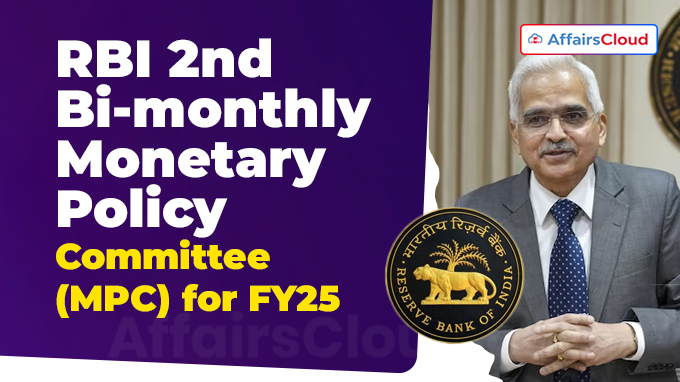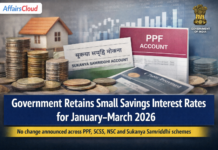 The Reserve Bank of India’s (RBI) Monetary Policy Committee (MPC) met on June 5 -7, 2024 and released its second Bi-Monthly Monetary Policy of Financial Year 2024-25 (FY25) which raised India’s real Gross Domestic Product growth forecast from 7% to 7.2% for FY25.The June FY25 meeting was the RBI’s 49th MPC meeting.
The Reserve Bank of India’s (RBI) Monetary Policy Committee (MPC) met on June 5 -7, 2024 and released its second Bi-Monthly Monetary Policy of Financial Year 2024-25 (FY25) which raised India’s real Gross Domestic Product growth forecast from 7% to 7.2% for FY25.The June FY25 meeting was the RBI’s 49th MPC meeting.
- RBI has projected the real GDP for Q1 at 7.3%, Q2 at 7.2%, Q3 at 7.3% and Q4 at 7.2%.
- The repo rate under the Liquidity Adjustment Facility (LAF) was kept unchanged at 6.50% for the 8th consecutive time. However, the two external members of RBI — Ashima Goyal and Jayanth R Varma showed their disapproval and voted to reduce the policy repo rate by 25 basis points.
- The MPC also decided to remain focused on withdrawal of accommodation to ensure that inflation progressively aligns to the target, while supporting growth whereas Ashima Goyal and Jayanth R Varma voted for a change in stance to ‘neutral’.
Note
The repo rate, which is the rate at which the RBI lends to commercial banks to meet shortage in funds and is a key tool to manage liquidity in the economy.
RBI’s Policy Rates :
| Category | Rate |
|---|---|
| Policy Repo Rate | 6.5% |
| Fixed Reverse Repo Rate | 3.35% |
| Standing Deposit Facility (SDF)Rate | 6.25% |
| Marginal Standing Facility (MSF) Rate | 6.75% |
| Bank Rate | 6.75% |
| Cash Reserve Ratio (CRR) | 4.50% |
| Statutory Liquidity Ratio (SLR) | 18% |
CPI inflation estimate for FY25 kept unchanged at 4.5%
i.Consumer Price Index (CPI) or retail inflation for 2024-25 is projected at 4.5 % with Q1 at 4.9%, Q2 at 3.8%, Q3 at 4.6% and Q4 at 4.5%.
- The forecast is based on the assumption of normal monsoon.
ii.RBI has set a target for CPI inflation of 4% within a band of +/- 2%.
iii. Headline inflation has eased from 5.1% in February to 4.83% in April 2024. Food inflation remains high due to increased price levels in vegetables, pulses, cereals, and spices. Further decline liquified petroleum gas (LPG) prices was observed in during March-April.
iv.Core (CPI excluding food and fuel) inflation eased to 3.2% in April, the lowest in the current CPI series.
v.The surge in Foreign Portfolio Investor (FPI) flows during FY24, with an inflow totalling $41.6 billion.
vi.Total flow of resources to the commercial sector was at Rs.31.2-lakh crore in FY24 is significantly higher than that of last year (Rs.26.4 lakh crore)
RBI enhances contingent reserve buffer to 6.5 pc amid positive economic outlook
RBI has decided to transfer Rs.2.11 lakh crore as surplus to the Central Government for the accounting year 2023-24 and as the economy seems to be robust and resilient, it has decided to increase the risk provisioning under the contingent reserve buffer (CRB) to 6.5% of the Reserve Bank’s balance sheet for 2023-24 from 6.0% in 2022-23.
- This would further strengthen RBI’s balance sheet.
Foreign exchange reserves touched $651.5 billion mark as on May 31, 2024
i.RBI’s report showed that India’s forex reserves jumped USD 4.837 billion to a new all-time high of USD 651.51 billion for the week ended May 31,2024.
ii.Foreign currency assets, a major component of the reserves, increased to USD 572.564 billion.
iii. The Special Drawing Rights (SDRs) were declined to USD 18.118 billion while India’s reserve position with the IMF was up to USD 4.326 billion.
Bulk deposit limit raised to Rs.3 crore from Rs.2 crore
i.RBI has hiked the threshold for bulk fixed deposits to Rs 3 crore from Rs 2 crore with an aim to improve asset liability management of banks.
ii.Single rupee term deposits of up to Rs 2 crore with Scheduled Commercial Banks (excluding Regional Rural Banks) and Small Finance Banks will now be part of retail fixed deposits.
iii.Furthermore, RBI has proposed to revise the definition of bulk deposits as ‘Single Rupee term deposit of Rs 3 crore and above’ for Scheduled Commercial Banks (SCBs) (excluding Regional Rural Banks(RRBs)) and Small Finance Banks (SFBs).
iv.It has also proposed to define the bulk deposit limit for Local Area Banks (LABs) as ‘Single Rupee term deposits of Rs 1 crore and above’, as applicable in case of RRBs.
RBI announces digital payments intelligence platform to check online frauds
i.The Reserve Bank of India (RBI) has proposed to set up a Digital Payments Intelligence Platform to prevent payment frauds and protect customers from associated risks and to fulfill the requirement for network-level intelligence and real-time data sharing across payment systems.
ii.It has constituted a committee under the chairmanship of A.P. Hota, former MD & CEO, National Payments Corporation of India (NPCI) to look into the aspects of the digital public infrastructure for the intelligence platform.
iii.The Committee is expected to give its recommendations within two months.
Inclusion of recurring payments for Fastag, NCMC, etc. with auto-replenishment facility under the e-mandate framework
i.RBI has announced the inclusion of auto replenishment facility of FASTag, National Common Mobility Card (NCMC) and United Payments Interface (UPI) Lite wallet balances under the e-mandate facility.
ii.Under the e-mandate framework, it has proposed to introduce an automatic replenishment facility for such payments and this replenishment will be triggered when the balance in FASTag or NCMC falls below a threshold amount set by the customer.
iii.Moreover, the introduction of auto replenishment of UPI Lite wallet has also been proposed alongwith its inclusion under the same e-mandate framework.
Note:
i.The Framework for processing of e-Mandate for recurring transactions was issued by the RBI in 2020 that provides recurring payments with fixed periodicity such as daily, weekly, monthly, etc.
ii.The current e-mandate framework requires a pre-debit notification at least 24-hours before the actual debit from the customer’s account.
Rationalisation of Export and Import regulations under Foreign Exchange Management Act (FEMA), 1999
i.RBI has decided to rationalise existing guidelines on export and import of goods and services under Foreign Exchange Management Act (FEMA), 1999 to align it with the changes in the global cross-border trade transactions.
ii.It aims to simplify operational procedures thereby promoting ease of doing business for all the stakeholders.
RBI Hackathon HARBINGER 2024 – Innovation for Transformation announced
i.The Reserve Bank of India (RBI) has announced the 3rd edition of its hackathon called ‘HaRBInger 2024 – Innovation for Transformation’.
ii.It encourages for tech-based solutions to tackle financial frauds under two main themes this year – ‘Zero Financial Frauds’ and ‘Being Divyang Friendly’.
iii.The RBI has set a prize of Rs 40 lakh for winners and a special cash prize of Rs 20 lakh for the best all-women team and will also offer a stipend of Rs 5 lakh for every shortlisted team.
Monetary Policy Committee
i.Under RBI Act,1934 (amended in 2016), RBI is is responsible for conducting monetary policy in India with the primary objective of maintaining price stability and growth.
ii.Section 45ZB of the RBI Act provides for the constitution of a six-member Monetary Policy Committee (MPC) to determine the policy rate required to achieve the inflation target.
iii.The first such MPC was constituted on September 29, 2016.
About Reserve Bank of India (RBI)
The Reserve Bank of India (RBI) is responsible for monetary stability, currency management, targeting inflation, regulating the banking system, and setting interest rates. It was established on April 1, 1935 in accordance with the provisions of the Reserve Bank of India Act, 1934.
Headquarters: Mumbai, Maharashtra
Governor: Shaktikanta Das




